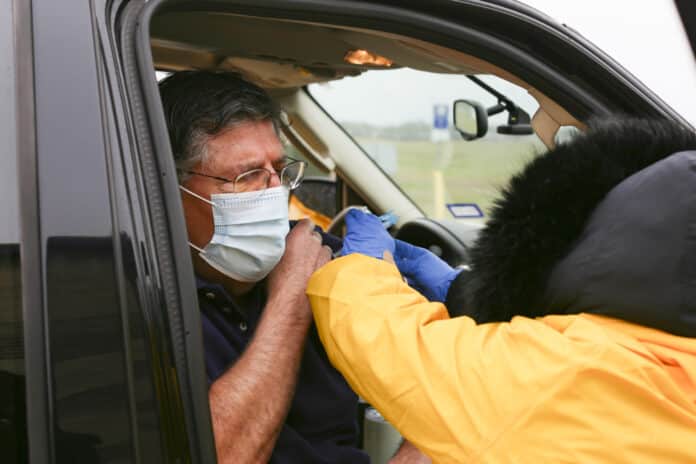Any semblance of a return to pre-pandemic normality is still months away, though there is a way to hurry it along, and that is to vaccinate as many people as possible as quickly as possible and keep wearing masks, social distancing, washing hands and avoiding crowded indoor spaces.
That’s according to Joseph B. McCormick M.D., epidemiologist and founder of the UTHealth School of Public Health in Brownsville, who noted that the fast-spreading U.K. variant of COVID-19, on track to become the world’s dominant strain if it’s not already, transmits very easily indoors. The good news is that the two main vaccines available in this county so far, from Moderna and Pfizer-BioNTech, are “quite effective” against the U.K. variant, he said.
What worries McCormick more is an extremely contagious variant that first appeared in Manaus, Brazil, that he describes as “terrifying.”
“Those variants have been introduced into the U.S,” McCormick said. “There are a lot of important questions. It may be that the U.K. variant is so infectious and it spreads so easily that it will out compete these others and they will never get a foothold. That’s a potential scenario.”
Echoing Dr. Anthony Fauci, the Biden administration’s chief medical adviser, he said vaccination is the key to combating the U.K. and other variants. That effort has been hampered by a massive shortage of vaccine, but it will get better, McCormick said, noting the Biden’s finalization of a deal for 200 million more Moderna and Pfizer doses by the end of July. Also, the drug company Merck, which abandoned its own vaccine effort, may begin making doses of the other companies’ vaccines in order to further boost supply.
“Let’s get people vaccinated, because the whole emergency of variants has to do with replication,” he said. “Replication is a statistical event. The more you have, the more likely you are to get variants. The more you can lower the replication rate of the virus, the less likely you are to have variants emerging, so that is I think the winning strategy here for the U.K. variant and overall.”
Still, vaccine shortage remains an issue for now, with distribution in rural areas especially tough because of a lack of ultra-cold refrigeration required to preserve the Moderna and Pfizer vaccines. Ideally, everyone 50 and older in the Rio Grande Valley, as opposed to 65 and older, would be eligible to receive vaccine now because of the high incidence of underlying conditions like diabetes, obesity and heart disease among the population that make catching COVID-19 more likely to be life-threatening, McCormick said.
But that’s not possible without more doses. Fortunately, a vaccine from Johnson & Johnson should be coming online soon, and it doesn’t require ultra-cold storage, he said.
“This is me speculating, but I think it’s going to get approval by the end of February,” McCormick said. “That will make a huge difference.”
He further speculated that a vaccine from Novavax is “probably not too far behind.” McCormick praised the city of Brownsville, which this month received a “vaccine hub” designation from the state, and Cameron County for smoothing out vaccine distribution even in the context of a dire shortage.
“With any of these kinds of things it requires a bit of a learning curve, but I think it went very quickly and I’m very impressed with how well we’re doing now,” he said.
McCormick said that an aggressive throws a wrench in the works, he’s optimistic he’s confident that by mid- to late summer “we are going to start to see something that looks much more like normal.”
“But we’re going to have to wear masks for a while until we start to see that really occur,” he said.
The worst thing we can do is to pretend that the pandemic is over, such as by jamming into crowded restaurants and bars where no one is wearing a mask or social distancing, McCormick said. The best to speed the return to normality is to behave as if we’re still in the middle of a deadly pandemic — which we are, he said.
“If we don’t do that we are going to prolong the agony,” McCormick said.




